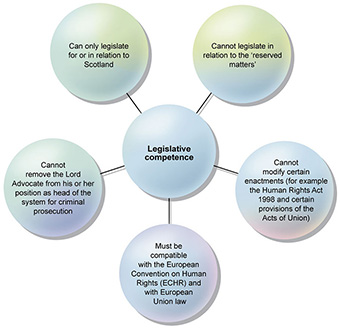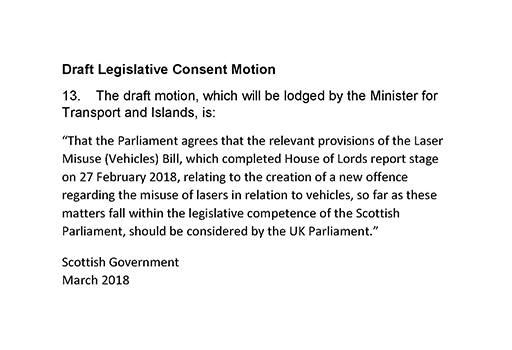2.1 Legislative competence
Legislative competence is a way of determining whether an Act of the Scottish Parliament has been produced within the powers of the Scottish Parliament. The Scotland Act 1998 transferred power to legislate (make laws) from the UK Parliament to the Scottish Parliament. The Scottish Parliament has power to make law on any matter that is not reserved. The areas on which it can make law are known as devolved matters. A list of these can be found in Box 1.
| Devolved | Dates on which it was devolved |
| Agriculture, forestry and fishing | All areas were devolved in 1998 under the Scotland Act 1998. |
| Education and training | All areas were devolved in 1998 under the Scotland Act 1998. |
| Elections to the Scottish Parliament | This area was devolved in 2012 and 2016. |
| Environment | Most areas were devolved in 1998. Energy efficiency schemes were devolved in 2016. |
| Health and social services | These areas, including the NHS, funding, health education, health services, medicine, public health and mental health were devolved in 1998. Social work was devolved in 1998. Social security benefits were devolved in 2016. |
| Housing | All areas, including policy and building control were devolved in 1998. Land use planning was devolved in 1998. |
| Law and order | Areas including civil justice, civil law and procedure, courts, criminal justice, criminal law and procedure, police, debt and bankruptcy, family law, freedom of information, legal aid, legal profession, licensing law and property law were devolved in 1998. The drink drive alcohol limit was devolved in 2012. Railway policing was devolved in 2016. |
| Local government | This area was devolved in 1998 and the local government franchise was added in 2016. |
| Sport and the arts | This was devolved in 1998 and includes support for creative industries, Creative Scotland, national gallery, library and museum collections, national performing companies, sportscotland and major events. |
| Some forms of taxation | Scottish Variable Rate of Income Tax was devolved in 1998. In 2016, the partial assignment of VAT revenues was given and in 2012, powers were given to set the Scottish Rate of Income Tax (SRIT), Land and Buildings Transaction Tax and Landfill Tax. |
| Many aspects of transport | Aspects of transport including passenger rail franchise, road signs, speed limits, air passenger duty were devolved in 2016. (Most powers over aviation, shipping and road traffic law are reserved as is HGV and bus driver, vehicle and operator licensing). |
| Welfare | Including social security benefits such as Disability Living Allowance, Personal Independence Payment, Carer’s Allowance, Severe Disablement Allowance, Discretionary Housing Payments and Winter Fuel Payments, fuel poverty schemes were devolved in 2016. |
Section 29 of the Scotland Act 1998 contains a limit on the power of the Scottish Parliament to legislate. This is known as the limit of ‘legislative competence’ and is an important factor in the law making process of the Scottish Parliament. Legislative competence is defined according to five criteria:
The concept of legislative competence is important because the Scotland Act 1998 requires the legislative competence of any Bill (a draft law) to be assessed before it is introduced in the Scottish Parliament. It also provides an opportunity for legislative competence to be challenged after a Bill is passed but before it can become law. If an Act is outside the legislative competence of the Scottish Parliament then it is void and unenforceable.


